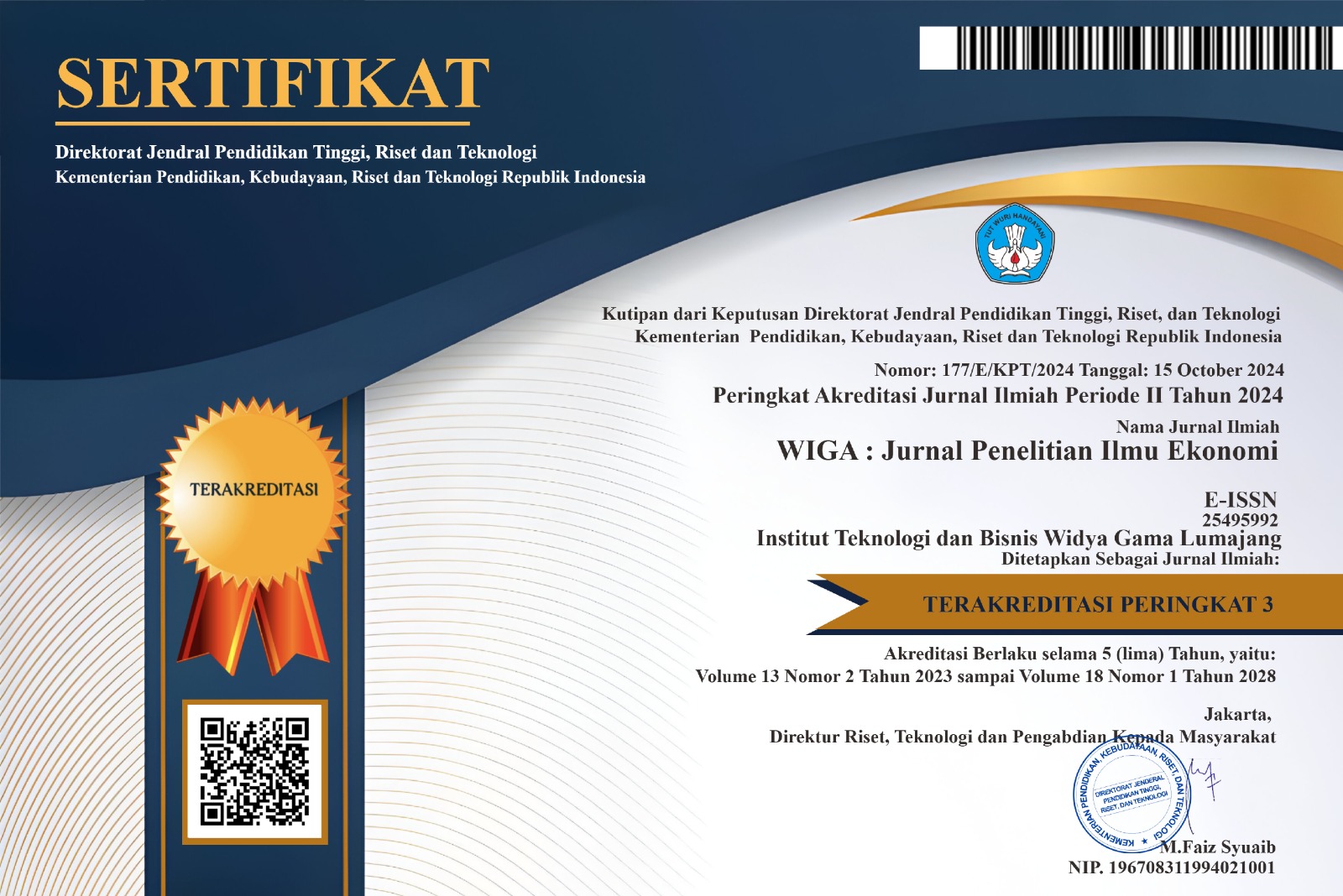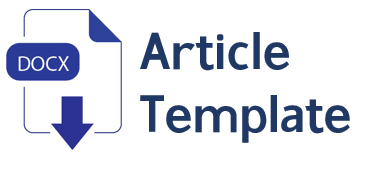Organizational Culture As A Moderation Of Influence Of Professional Commitment And Moral Reasoning On Independent Auditors' Ethical Decisions
DOI:
https://doi.org/10.30741/wiga.v13i1.945Keywords:
Organizational Culture, Ethical Decisions, Professional Commitment, Moral ReasoningAbstract
This study aims to provide empirical evidence regarding the effect of professional commitment and moral reasoning on ethical decisions and the ability of organizational culture to moderate the effect of professional attention and moral reasoning on ethical decisions. The population of this study was independent auditors of the capital market at KAPs in the East Java and West Java Regions who were actively registered with the OJK. The sampling method used the total sampling technique and obtained a sample of 59 people. The data analysis technique used is the PLS model. The results showed that professional attention has a positive effect on ethical decisions, moral reasoning has a positive effect on ethical decisions, organizational culture strengthens the effect of positive professional attention on ethical decisions, and organizational culture strengthens the effect of positive moral reasoning on ethical decisions.
Downloads
References
Abdurrahman, & Yuliani, N. L. (2011). Determinasi Pengambilan Keputusan Etis Auditor Internal (Studi Empiris pada BUMN dan BUMD di Magelang dan Tangerang). Widya Warta, 2(XXXV), pp. 133–150.
Ahyaruddin, M., & Asnawi, M. (2017). Pengaruh Moral Reasoning dan Ethical Environment Terhadap Kecenderungan Untuk Melakukan Whistleblowing. Jurnal Akuntansi dan Ekonomi, 7(1), pp. 1-20.
Asni, N., Dali, N., Tuti, D., & Syafitri, A. A. (2018). The influence of locus of control and professional commitment toward auditor’s behavior in conflict situation. IOSR Journal of Economics and Finance (IOSR-JEF), 9(4), pp. 75–83.
Bline, D. M, Meixner, W. F., & Duchon, D. (1991). The Measurement of Organizational and Professional Commitment: An Examination of the Psychometric Properties of Two Commonly Used Instruments.". Behavioral Research in Accounting, 3, pp. 1–12.
Cnbcindonesia.com. (2019). Lagi-lagi KAP kena Sanksi OJK, Kali Ini Partner EY. Diunduh dari www.cnbcindonesia.com website: https://www.cnbcindonesia.com/market/20190809100011-17-90855/lagi-lagi-kap-kena-sanksi-ojk-kali-ini-partner-ey.
Cohen, J. R., Pant, L. W., & Sharp, D. J. (2001). Examination of Differences in Ethical Between Canadian Business Students and Accounting Professionals. Journal of Business Ethics, 30, pp. 319–336.
Cohen, S., & Leventis, S. (2013). Effects of municipal, auditing, and political factors on audit delay. Accounting Forum, 37(1), pp. 40–53.
Dewi, N. P. S. U., & Sumadi, N. K. (2020). Pengaruh Budaya Etis Organisasi dan Integritas terhadap Kualitas Audit dengan Sensitivitas Etika Auditor sebagai Variabel Moderasi pada Kantor Akuntan Publik di Denpasar. Jurnal Hita Akuntansi Dan Keuangan, 1(2), pp. 63–94.
Dewi, P. P., & Dwiyanti, K. T. (2018). Professional Commitment, Self-efficacy and Ethical Decision Auditor. International Research Journal of Management, IT I Social Sciences, 5(6), pp. 93-104.
Douglas, P. C., Davidson, R.A., & Schwartz, B.N. (2001). The Effect of Organizational Culture and Ethical Orientation on Accountants’ Ethical Judgments. The Journal of Business Ethics, pp. 101–121.
Dewi, N. P. S. U., & Sumadi, N. K. (2020). Pengaruh Budaya Etis Organisasi dan Integritas terhadap Kualitas Audit dengan Sensitivitas Etika Auditor sebagai Variabel Moderasi pada Kantor Akuntan Publik di Denpasar. Jurnal Hita Akuntansi Dan Keuangan, 1(2), 63–94.
Dewi, P. P., & Dwiyanti, K. T. (2018a). Professional Commitment, Self-efficacy and Ethical Decision Auditor. International Research Journal of Management, IT & Social Sciences, 5(6), 93–104. https://doi.org/https://doi.org/10.21744/irjmis.v5n6.379
Douglas, P. C., Davidson, R. ., & Schwartz, B. . (2001). The Effect of Organizational Culture and Ethical Orientation on Accountants’ Ethical Judgments. The Journal of Business Ethics, 34, 101–121. https://doi.org/https://doi.org/10.1023/A:1012261900281
Duska, R., Duska, B. S., & Ragatz, J. (2011). Accounting Ethics. Wiley-Blackwell.
Dwirandra, A., & Suryanawa, I. K. (2018). Idealism and Professional Commitments Mediation the Effect of Work Experience and Training on Ethical Decision Making of Tax Consultants. Research Journal of Finance and Accounting, 9(21), pp. 85–94.
Economy.okezone.com. (2019). Kronologi Kasus Laporan Keuangan Garuda Indonesia hingga Kena Sanksi. Diunduh dari www.economy.okezone.com website: https://economy.okezone.com/read/2019/06/28/320/2072245/krono logi-kasus-laporan-keuangan-garuda-indonesia-hingga-kena-sanksi.
Faisal. (2007). Tekanan Pengaruh Sosial dalam Menjelaskan Hubungan Moral Reasoning Terhadap Keputusan Auditor. Jurnal Akuntansi Dan Keuangan Indonesia, 4(1), pp. 25–46.
Fallah, S. (2006). Pengaruh Budaya Etis Organisasi dan Orientasi Etika Terhadap Sensivitas Etika (Studi Empiris Tentang Pemeriksaan Internal di Bawasda Pemda Papua). Tesis. Universitas Diponegoro.
Febriani, R. W. (2017). Pengaruh Moral Reasoning dan Ethical Sensitivity Terhadap Persepsi Etis Mahasiswa Akuntansi (Studi pada Mahasiswa Akuntansi Universirtas Muhammadiyah Tangerang). Jurnal Manajemen Bisnis, 6(1), pp. 18–25.
Ghozali, I. (2006). Aplikasi Analisis Multivariate dengan Program SPSS (4th ed.). Badan Penerbit Universitas Diponegoro.
Ghozali, I. (2011). Structural Equation Modelling: Metode Alternatif dengan Partial Least Square (PLS) (Ketiga). Semarang: Badan Penerbit Universitas Diponegoro.
Govindarajan, K. (1986). Impact of Participation in the Budgetary Process on Managerial Attitudes and Performance: Universalistic and Contingency Perspectives. Decision Sciences, 17(4), pp. 496–516.
Hall, M., Smith, D., & Langfield-Smith, K. (2005). Accountants’ Commitment to Their Profession: Multiple Dimensions of Professional Commitment and Opportunities for Future Research. Behavioral Research in Accounting, 17(1), pp. 89–109.
Hartanto, O. (2016). Pengaruh Locus of Control, Tekanan Anggaran Waktu Komitmen Profesional, Terhadap Perilaku Disfungsional Auditor. EKUITAS (Jurnal Ekonomi Dan Keuangan), 20(4), pp. 473-489.
Hermawan, S., Nur, L., & Sari, I. (2018). Motivation as Moderating Variable on the Effect of Moral Reasoning and Ethical Sensitivity Toward the Ethical Behavior of Accounting Students. Journal of Accounting and Business Education, 3(1), pp. 72–92.
Hofstede, G., Bond, M. H., & Luk, C. (1993). Individual Perceptions of Organizational Cultures: A Methodological Treatise on Levels of Analysis. Organization Studies, 14(4), pp. 483–503.
Undang-Undang Republik Indonesia Nomor 5 Tahun 2011 Tentang Akuntan Publik. (2011). Indonesia.
Institut Akuntan Publik Indonesia. (2021). Standar Profesional Akuntan Publik. Diunduh dari www.iapi.or.id website: https://iapi.or.id/Iapi/detail/362.
Ismail, S., & Yuhanis, N. (2018). Determinants of Ethical Work Behaviour of Malaysian Public Sector Auditors. Asia-Pasific Journal of Business Administration, 10(1), pp. 21–34.
Januarti, I. (2011). Analisis Pengaruh Pengalaman Auditor, Komitmen Profesional, Orientasi Etis adn Nilai Etika Organisasi Terhadap Persepsi dan Pertimbangan Etis (Auditor Badan Pemeriksa Keuangan Indonesia). Proceeding SNA 14. Banda Aceh.
Jasmine, T. J., & Susilawati, C. (2019). Pengaruh Penalaran Moral dan Sensitivitas Etika Terhadap Persepsi Etis dengan Gender Sebagai Variabel Moderasi. Jurnal Akuntansi Bisnis, 17(1), pp. 64–81.
Khusnah, H. (2020). Organizational Ethical Culture, Moral Reasoning: Pengaruhnya terhadap Ethical Decision Making dan Whistleblowing Intention. Business and Finance Journal, 5(1), pp. 35–45.
Kohlberg, L. (1969). The Cognitive Developmental Approach to Socialization. Handbook of Socialization Theory and Research. Chicago: RandMcNally.
Kohlberg, L. (1971). Stages of Moral Development as a Basis of Moral Education. New Yorks: Newman Press.
Kurniawan Saputra, K. A., Sujana, E., & Tama, G. M. (2018). Perspektif Budaya Lokal Tri Hita Karana dalam Pencegahan Kecurangan pada Pengelolaan Dana Desa. Jurnal Akuntansi Publik, 1(1), pp. 28–41.
Larkin, J. M. (1990). Does Gender Affect Auditor KAP’s Performance? The Woman CPA. Spring, pp. 20–24.
Pangestu, F., & Rahajeng, D. K. (2020). The Effect of Power Distance, Moral Intensity, and Professional Commitment on Whistleblowing Decisions. Journal of Indonesian Economy and Business, 35(2), pp. 144–162.
Reason, J. (1990). Human Error. Ashgate.
Rest, J. R. (1979). Received Manual for the Defining Issues Test: An Objective Test for Moral Judgment Development. Minnepolis: Minnesota Moral Research Proyect.
Shafer, W. E., Richard S. S., & Yip. R. W. Y. (2016). Social Responsibility, Profesional Commitment and Tax Fraud. Accounting, Auditing, Accountability Journal, 29(1).
Sutrisno, E. (2018). Budaya Organisasi (Edisi Pertama). Jakarta: Prenamedia Group.
Tandiontong, M. (2013). Pengaruh Faktor Komitmen Profesi Akuntan, Komitmen Organisasi Kantor Akuntan Publik dan Kepuasan Kerja Auditor terhadap Implementasi Audit Independen atas Laporan Keuangan( Survei terhadap Akuntan yang bekerja sebagai Auditor pada KAP di Indonesia). Jurnal Ilmu Manajemen Dan Bisnis, 4(1), pp. 1–19.
Trevino, L. K. (1986). Ethical Decision Making in Organization: A person Situation Interactionist Model. Academy of Management Review, July, pp. 601–6
Wirakusuma, M. G. (2019). Pengalaman Memoderasi Pengaruh Idealisme dan Komitmen pada Keputusan Etis Konsultan Pajak di Wilayah Provinsi Bali. Jurnal Ilmiah Akuntansi Dan Bisnis, 14(1), pp. 10–18.
Yudhistira, R. A. dan H. (2017). The Influence of Organizational Culture, Professional Commitment and Level of Religiosity to Ethical Judgement of the Auditor : Indonesia Evidence. The Indonesian Journal of Accounting Research, 20(2), pp. 215–236.
Downloads
Published
How to Cite
Issue
Section
License
Copyright (c) 2023 Gede Mandirta Tama, Gerianta Wirawan Yasa, I Wayan Ramantha, Ni Ketut Rasmini

This work is licensed under a Creative Commons Attribution-NonCommercial 4.0 International License.










